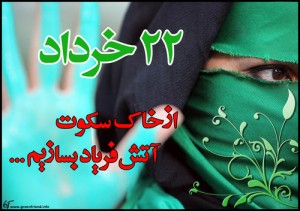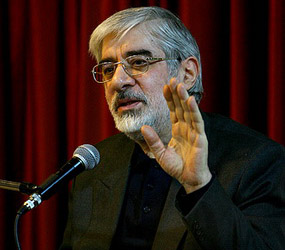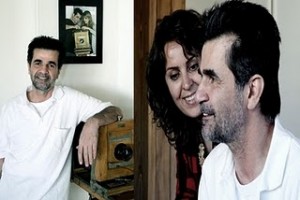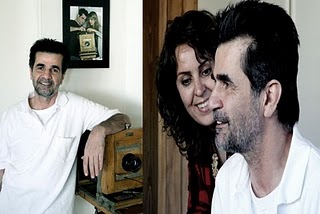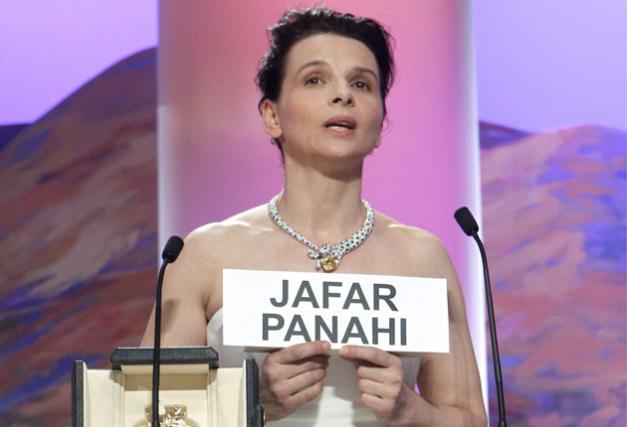UPDATED Iran: Full Text of Karroubi Interview "Aligning the Green Movement"
 Thursday, May 27, 2010 at 9:10
Thursday, May 27, 2010 at 9:10 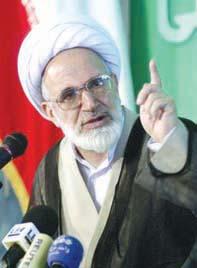 Our gratitude to Masih Alinejad, who interviewed Mehdi Karroubi for Rah-e-Sabz and provided this translation for EA. Khordaad 88 have also posted an English version of the discussion:
Our gratitude to Masih Alinejad, who interviewed Mehdi Karroubi for Rah-e-Sabz and provided this translation for EA. Khordaad 88 have also posted an English version of the discussion:Mr Karroubi, a year has passed since the eventful month of Khordad 1388 (22 May-21 June 2009). Yet this month is considered to be a historic one in Iran: the epic election victory of Mohammad Khatami on 2 Khordad 1376 (23 May 1997), the brave resistance that led to the liberation of the southern city of Khorramshahr on 24 May 1982, the 15 Khordad Movement (5 June 1963), and the much disputed and controversial election of 12 June which led to the formation of the people’s Green Movement. Is it possible to find an explicable link between these events?
Iran Analysis: When Allies Co-ordinate (Mousavi & Karroubi)
The Latest from Iran (27 May): Cooperation and Feuds
The root and foundation of this [Islamic] Revolution was the 15 of Khordad which was referred to by its founder [Imam Khomeini] as the beginning of the [Islamic] Revolution and unforgettable. Khordad is an eventful month. But what is of more importance for us is that these events must be examined. For instance, even the presidential election of 2005 must be re-examined. An election during which we, as reformists, had control of government, but for reasons I do not wish to discuss here, we lost everything and the outcome was that the country fell into the hands of these people and this group, and as a result the people and country are faced with its consequence and the hardships that have followed.
You say that in 2005 when Ahmadinejad and Hashemi Rafsanjani succeeded in reaching the second round of the elections, certain events unfolded that caused the reformists to lose everything. But last year and before the election, when I asked you during an interview whether according to the hypothesis that ‘revolutions eat their own children’, you considered yourself as the eaters or the eaten, after which you responded with a smile: “I am not among the eaten and I would never like to see a child of this revolution be eaten.” Do you still have the same beliefs or did you believe at the time that despite the controversial 2005 election, one could hope for a yielding on the part of radical forces?
Following the death of Imam Khomeini, we anticipated that we would be isolated by certain individuals. But we never foresaw such circumstances. However, the current conditions are not only hard on us, but on the rest of the country too. Despite the fact that I have anticipated these conditions, we are witnessing that these (the children of the revolution being eaten) have occurred for most of the people among the [Islamic] Revolution’s first generation, and it because of a person who is currently leading the country’s executive branch. But if this person had been appointed by the people, they wouldn’t be troubled by the situation as he would be both legitimate and legal.
As we enter the second year of the Green Movement, what do you think are the points of strength and weakness of the Green Movement?
I am completely satisfied and happy about my own behaviour, comments and actions. If according to them [the authorities], I have acted radically, it was the outcome of their own actions. I have never acted radically as I have never distanced myself from my revolutionary ideals. Within the past year, I have always proceeded, according to my responsibility towards a people whose rights had been neglected. During one of the televised debates last year, I mentioned that I had come forth prepared for Jihad and I am ready to pay any price in this path. The first night after I became a [presidential] nominee, I knew this would be a bumpy ride, but out of necessity and in order to prevent the dissolving of different parties, I had to take part in the elections.
What about the others? You, Mousavi and Khatami, you each make speeches and issue your statements separately. Do you think we can expect to see joint statements by two or three people in the Green Movement’s second year?
I believe that each of us must play his own role and to maintain and continue the individual activities. However, when there is a need for a joint statement, this should be the case. For one particular issue, I made a proposal which was welcomed too, however it was not turned into action and therefore I acted independently.
Having said that, do you see a reason to form a leadership core for the Movement? What is your strategy for the Movement’s leadership?
First of all, this is a popular Movement and its leaders are the people and the Movement is moving towards a direction which the people desire. The people control the pulse of the Movement. If this Movement has a leader other than the people themselves, the opposing side will quickly eliminate that leader. When Mr Mousavi and I formed a four-person committee—Mr Beheshti and Moghaddam appointed by Mr Mousavi and Mr Alviri and Amini appointed by me—to attend to the needs of post-election victims, three of these four men were quickly arrested and sent to prison and their activities were brought to a halt. Under such circumstances, only the people can lead the Movement.
Critical newspapers have and political parties have been shut down, as the chairman of a political party, what is the future you foresee for the Movement? With the total control and dominance of the military and security forces, what opportunities does the Green Movement have for making its presence and its continuation felt?
The first part of this question is related to the previous question. These gentlemen [the authorities] did not even tolerate a single party office. They did not even tolerate a party newspaper. They did not tolerate it when people came to meet with me at my office. They did not tolerate the few newspapers and magazines which they refer to as “outsiders”. The authorities have become so preposterous and fearful that they force people who visit me to give written assurances that they will not visit me ever again. They can’t even tolerate a weekly magazine. They can’t tolerate our presence in public and official gatherings and appoint individuals to disrupt the ceremony or to attack us.
In answering the second part of your question, I must say that the very fact that the Movement announces its presence before every ceremony or event is in itself a sign of struggle and a continuation of its path. The Movement’s desire for change is a sign of life and its presence. On the other hand, we must stand firm with respect to what we say and must act accordingly and we should also be ready to pay the price involved. The fact that authorities are planning for the anniversary of the passing of Imam [Khomeini] or the tight security measures in ceremonies and exhibitions are in fact signs that the Movement is alive. Just as they prevented me from taking part in a religious ceremony for the martyrdom of Zahra PBUH [daughter of Prophet Mohammed]. A great number of armed forces had been prepared with clubs, daggers, bricks, etc, just to prevent me from taking part in the ceremony. All of these actions mean that we are present and the Movement is alive and will stay alive.
Until what point are you going to continue to issue statements and avoid routing for certain necessities of struggles?
Our Movement is a civil one. Our Movement is not an armed or violent one. In which statement have I said something that I did not act upon? Haven’t I been present among the people whenever I had the chance? They have banned my sons from leaving the country. They have attacked my house twice. They have closed down my personal office, my party and my party’s newspaper. They banned the Irandokht publication which belonged to my wife’s institute. They intended to assassinate me in Qazvin. They attacked one of my sons and severely wounded while in detention. They have attacked me and my bodyguards during different demonstrations. Are these not actions in your opinion? They have arrested many of those close to me. Those currently in power must know that Mahdi Karroubi is prepared to pay any price for this cause.
One of the demands constantly mentioned in these statements is holding free elections. Is there any hope that one day party-based parliamentary or presidential elections will be held? Do you think that the notion of “party” will have a place in the future of Iran? When we speak of political parties do we mean a party with the ability to influence the state based on the votes it receives from the people?
This is what we should be seeking but there are two difficult obstacles ahead. The first one is the regime which does not wish such a thing, and the second is that the political groups are not used to organisational work and I have said many times that these groups are either oppose party-based activity or evade it. Party-based action is quite difficult in Iran and we need time to learn how to approach a party in the country.
You have been credited with the use of the term “boat of the regime” in the Green Movement’s literature, but some believe that it is you who has left this ship. Where is this boat or ship of the Islamic Republic moving?
It is indeed a boat and its capacity it has the capacity of a boat and cannot contain 75 million people. This boat cannot withstand the mildest storm or clouds. I hope that one day, this boat is transformed into a ship which can carry and accept the entire Iranian people.
You were imprisoned during the previous regime. Frankly speaking, has the situation of the prisons and courts in Iran improved or declined since then?
The problem with the previous regime was corruption. A revolution has occurred and new revolutionary forces have risen. Yet since this revolution has turned into a boat and has become exclusive and the people on this boat want it for themselves and their own interests. They have confronted the people in order to keep them out of this boat. A small group of people have control of the country’s management and as they lack of the ability to run the country, they are trying to exert pressure on the people and are increasing the pressure. The situation has become worse. Back then [pre-revolution era], no one gathered outside the house of any of the revolutionaries or treated prisoners like they treat Mr Nourizad now, this is the start of further digressions. As the group currently governing the country have no base of support among the people, they want to increase the pressure on the people in order to gain legitimacy. The same chain killings [in the 90s] have gradually spread out over time, such that [true revolutionary] fighters such as Dariush Farouhar were killed by these same people [who are in power]. Many others may well have been murdered at their hands, had they not been confronted. There needs to be an end to these radical actions. During the Shah’s era, there was not republic. In the Islamic Republic, everyone is considered equal. According to the Iranian constitution, even the leader is considered to be equal to the rest of the people. But now, certain impulsive actions are starting to take place.
You say that under the constitution, even the leader is equal to the rest of the people, so what is the Council of Expert doing? Are they doing anything for the people and their constitutionally designated responsibilities besides just talking? Why did the Assembly of Experts and its head remain silent after a portion of the Assembly critical of the leader and were met with threats and even attacks by plain-clothed militia?
During Imam [Khomeini’s] time, the Assembly of Experts had a certain path and mechanism. During its first term, prominent figure and qualified clerical authorities were in the Assembly. This same Assembly elected Ayatollah Khamenei as leader after the death of Imam Khomeini. In the following year, due to narrow-mindedness and in an attempt to prevent the election of certain figures into the Assembly, the task of carrying out the vetting process was taken from teachers of religious schools and handed over to the Guardians Council whose members were appointed by the leader himself. The fate of a Guardians Council, whose observers have to pass through the filters of individuals such as Mr Jannati, is clear. The strongest point in the constitution is article 108 which has turned into one of the weakest points because of the actions of these individuals [in the Guardians Council]. It is not a question of individuals or the time, but it is about the true standing of a body. A while ago I also wrote a letter to Mr Hashemi Rafsanjani regarding the responsibilities of the Guardians Council.
In one sentence, please describe how you felt during the night of each of these critical demonstrations:
15 June: I was joyful because of the great wave and presence of the people. But at night when I heard that a great number of people had been killed, I couldn’t believe that such mistreatment of the people was taking place in the Islamic Republic and I was quite saddened.
20 June: I was extremely saddened because of the killings that took place on that day.
Jerusalem Day (18 September): I was quite happy about the people’s massive presence in the demonstrations on that day.
4 November: On that day, I went out to participate in the rallies and they blocked our way and used pepper spray against us. One of my bodyguards was injured as a result of the substance thrown at us. When we got home, I learned that a number of people had been killed and arrested. I could not believe the continuation of this harsh treatment of people and I asked myself why they were being mistreated in such a way.
Ashura (27 December): I was concerned from the morning. I went to a religious ceremony on that day, but heard while I was there, that one person had been thrown off a bridge and a police car had run over some of the people, this saddened me very much and the feeling grew by the moment. However, I was more saddened because of what had happened on Ashura which is a religious ceremony, they were killing people on a day when everyone morns the martyrdom of Imam Hussein (PBUH), a day whose sanctity must always be respected.
22 Bahman (11 February): I had braced myself for everything. When I joined the crowd, we were attacked brutally. The used pepper spray against us, as a result I could not open my eyes for hours. For a week, I was suffering from pains in my eyes as well as respiratory problems. When we returned home, I heard that clashes had taken place a number of people had been arrested and I was informed that my son Ali had been detained. I was very saddened by what had happened and could not believe that such violence was used against the country’s own children.
Mr Karroubi, you pay visits to many well-known political prisoners and sympathise with their families. For instance, you have met with the families of Jafar Panahi, Mohammad Nourizad and other prisoners who have gone on strike. What are your plans regarding the many unknown students and prisoners such as Majid Tavakkoli who was neither a politician nor an artist?
Unfortunately, the situation for unknown prisoners is very worrying. As I have said before, we had previously set up a committee to investigate the status of the prisoners, but even this, was not tolerated and they imprisoned the members of the committee which was to assist other prisoners. I have always been concerned about prisoners whose families are faced with great hardship. I have spoken to the family of student activist Mr Tavakkoli. A student, whose criticism is within the framework of the constitution, does not deserve imprisonment in response. I have spoken to the families of some prisoners from smaller cities via phone. People do not deserve to be treated this way. But I am sure that the pain that the families and mothers of unknown prisoners endure makes them worthy of great praise.
In your statements, you have referred to the photos and videos taken as a result of the people’s sense of responsibility and citizenship, as evidence of violence used against ordinary people. These images and thousands more pictures and footages were never shown on national television, but were the result of efforts by ordinary citizens who recorded them on their mobile phone cameras and posted them on websites, weblogs and social networking websites such as Facebook and Twitter. Have you seen those videos for yourself or are you aware of the wave of protests in cyber space against the restrictions faced by your bodyguards? The youth voluntarily launched a campaign saying that they were willing to be the bodyguards of Mahdi Karroubi or Mir Hossein Mousavi. I would like to know your overall opinion about the Movement formed by citizen journalists to inform everyone about the street violence and to shape a symbolic solidarity.
Yes, I became saddened and felt ashamed of the violent treatment in the Islamic Republic, because even during the corrupt Shah’s reign they people were not treated this way. I have mentioned this countless times in my letters and at the time we made videos of people who had been tortured, but before filming them we asked them not say something just for the sake of our liking and to always consider God and to know that nothing was concealed from him and that each person was responsible and would be held accountable for their own actions. When I saw their black-and-blue bodies, I felt very sorry and was saddened that the people were treated this way only for protesting against an election result. We were not trying to construct evidence or to hand them over to anyone. We made two copies of the videos, kept one copy for ourselves just in case the tortured would be placed under pressure to deny their own previous claims. And their terrorising was affective too, because some of them were placed under such torture that they had to deny their own words, some were even forced to flee the country and others decided not to pursue [the torture claims] any longer after they felt a sense of insecurity in their lives.
With regards to what happened for my bodyguards, I became happy when I heard that the youth had come up with such proposals, but I never wished to trouble anyone, and wherever I went, I was accompanied by my sons. I would also like express my gratitude towards the youth for their efforts in the country’s path towards greatness and wish prosperity and good health in their lives.
My next question is about the opposition movement created among Iranian outside the country. Do the leaders of the Green Movement have any agendas for organising the forces inside and outside the country? Why do you not make use of the great assets of all Iranians in this struggle?
A Movement has started within the country. Iranians outside the country have also come forward and have supported this Movement. The efforts and actions of Iranians outside the country are praiseworthy, but we must consider the conditions inside the country too. I would like to ask Iranians abroad to take into account certain issues in their demands, expectations and slogans. Unfortunately, sometimes certain radical actions outside the country are reflected inside the country and unfortunately the regime uses this as a tool to oppress the forces within. Iranians outside the country are conveying the message of the people inside the country to other nations and countries and I hope that the slogans coming from both inside and outside the country move towards convergence. We must also be aware of infiltrations by individuals who chant radical slogans which give an excuse to the authorities to crack down on the people’s movement. This Movement will persist and people both inside and outside the country will gradually become more in tune with each other, and we must know that this victory requires time.
Certain liberal wings of the Green Movement ask about the 1979 Islamic Revolution and would like to candidly know why totalitarianism and interest-based oppression reappeared in the words of the revolutionary leaders from the very outset of the revolution. In exposing the post-election crimes, you bravely stepped forward and did not sacrifice the truth for interest. You had previously been outspoken against the illegality of certain restrictions such as the Guardians Council’s vetting process, but these are not all the injustices that the revolution has brought about in Iran with the promise of making an ideal heaven on earth. You will be asked about the first decade of the revolution and about Imam Khomeini’s leadership and its different aspects. If you respond with candidness and liberty, certain supporters of the Movement will be discontented (the same who lack thought and are not yet able to break free from the chains of character idolisation and are still not able to practice self-criticism) and if you do not act fairly and take into account certain considerations and attempt to sanitise the discourse of Imam Khomeini and the events of the first decade of the revolution, it will be to the dismay of another wing of the Green Movement (this wing consists of at least two groups: a group that still holds past grudges and cannot see anything but the darkness of that era, and might not even put up with a fair recall of the good as well as the bad of those days, and another group which tries to be even-handed in favour of shedding light and moving towards breaking free from passing judgements). Moderation under such circumstances is quite difficult and can only be carried out by brave leaders. With this explanation, I’d like to ask how you assess the first decade of the revolution and Imam Khomeini’s leadership and to what extent do you see the Iran’s current problems as rooted in the political action and thinking of that era?
We must examine the problem and see which ones are rooted in the past and which ones have been created recently. The first decade of the revolution was a decade of resistance, sacrifice, etc. I think the serious problems that we are facing now, came about after the death of Imam Khomeini. For instance, the sessions of the Assembly of Experts was always held in the same location as the former Majlis. But following the death of Imam Khomeini and against previous norms, their sessions were held at a mosque. Or for instance, we saw that during the mid-term elections, the Guardians Council disqualified many political and religious figures in the name of the monitoring the election. The revolution which was founded by Imam Khomeini has been derailed from its path by a few people. After the death of Imam Khomeini the frauds began. During this recent presidential election—which was an appointment rather than a real election—an estimation of the votes had been determined prior to the election and the votes had been rationed in a rather interesting way.
Further study is needed in this regards.
In any case, many are critical of your views, what do you think are the most important common grounds between you and the generation which seems to have difference tastes, beliefs and even appearance from you, considering that they have all come together under the banner of the Movement and even feel close to you, a cleric?
Seeking justice, fulfilling citizen rights as well as dignity and greatness for Iran.
Thank you for your time

